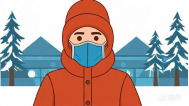
You’ve probably heard “Don’t go outside in the winter with your hair wet or without a coat; you’ll catch a cold.” That’s not exactly true. As with many things, the reality is more complicated. Here’s the distinction: Being cold isn’t why you get a cold. But it is true that cold weather makes it easier to catch respiratory (呼吸的) viruses such as the cold and flu.
1.1.Why do viruses remain infectious longer during winter?
A Dry air brings smaller particles.
B People cough longer in winter.
C More types of flu come in winter.
D Cold air weakens people’s immune system.
解析:选A。A 细节理解题。根据第三段最后两句可知,冬天干燥的空气会让呼吸道飞沫中的水分蒸发得更快,从而产生更小的颗粒,这些更小的颗粒能够持续更长的时间并传播得更远。故选A。
2.2.How could sunny days in winter affect one’s immune systems?
A The air is dryer and makes it easier for viruses to spread.
B People are more likely to catch a cold.
C People can get more vitamin D from the sunlight.
D People tend to stay indoors and exercise less.
解析:选C。C 细节理解题。根据第四段中的“That is a problem because the sun is a major source of vitamin D, which is essential for immune system health.”可知,维生素D的主要来源是皮肤在阳光照射下的自然合成,而维生素D对免疫系统至关重要。故选C。
3.3.The virus might spread faster when ________.①the virus’s outer layer becomes stronger ②we stand too close to an infected person③we spend most of the time at home ④we feel our nose and throat dry
A ①②③
B ①②④
C ②③④
D ①③④
解析:选B。B 细节理解题。根据第二段可知,寒冷的空气使病毒的外层更坚固,让病毒更容易在人与人之间传播,故①正确。根据倒数第三段可知,呼吸道病毒通常在感染者周围6英尺范围内传播,即站得离病毒源越近,越容易感染,故②正确。根据倒数第二段可知,低温低湿度会让鼻子和喉咙的黏膜变得干燥,在吸入病毒时就更容易附着,故④正确。故选B。
4.4.What will the text probably talk about next?
A The symptoms of common colds and flu.
B Approaches to prevent sickness throughout the year.
C The importance of vitamin D for immune health.
D The science behind virus transmission in cold weather.
解析:选B。B 推理判断题。根据最后一段的“There are strategies to help prevent illness all year long.”有一些策略可以全年帮助预防疾病,即接下来作者可能会介绍预防疾病的方法。故选B。